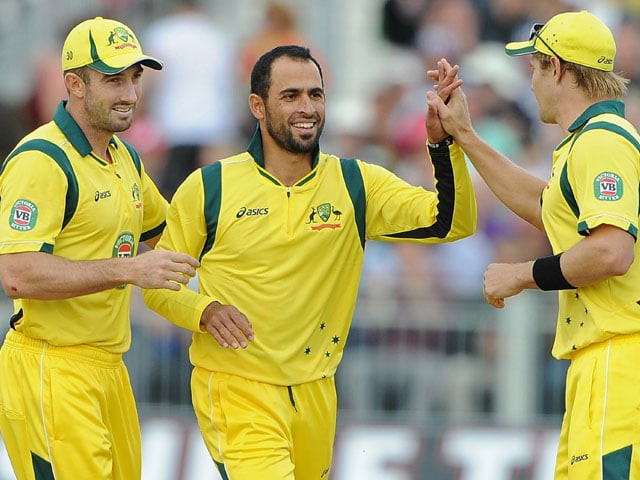There has been some furor over the selection of Fawad Ahmed in the Australian cricket team, and his subsequent refusal to bear an alcohol company’s logo on the uniform. The company happens to be one of the sponsors of Cricket Australia, and many have lambasted Fawad for the un-Australian sentiments he has communicated through his choice.
He has been told by renowned Australian sportsmen to pack it up and go home. In a world where the religion vs secular debate is on-going, people have even opined that one seeking asylum from a religion-centric country, in a secular country, cannot hope to gain the best of both worlds.
In my humble opinion, many of the enlightened visionaries in the world seem to hold an extremely myopic view of what a secular state is founded on. Most secular states do not categorically state that an individual cannot follow the basic tenets of his/her faith, as long as they do not appear to harm the society’s overall interest. Similarly, at no point did the Australian law require Fawad to choose the best of only one world. Hence, he shouldn’t be criticised just because he chose to muster up enough courage to communicate his beliefs.
In this prejudiced world, I can’t imagine a person of another faith being held to such scrutiny if he were to express his desire to do or not do a certain thing, based on his beliefs. Let’s look at a live example – a turban has never been a part of the team uniform, and yet, the dear and lovable Monty Panesar was never questioned about it. Somehow, turbans have always been deemed acceptable head-gear by the governing bodies; and frankly, there’s nothing wrong with that. However, we all know that things would have been a bit different if Owais Shah were to have appeared before the England team wearing a skullcap over his head. It seems that we are quite unprepared in handling cultural fault lines.
So let’s all just relax, take a step back and calmly assess the situation for a moment. It’s not as if Fawad Ahmed has asked for the inclusion of any Islamic symbology on the Australian uniform, right?
Neither has he set out to make a public statement through his decision.
He has simply asked for a way out of an ideology that was in direct contradiction to his own faith. Of course, credit must be given to Cricket Australia for their mature choice of giving Fawad the opportunity to choose, and then to accept his choice. Even if Cricket Australia had refused him the chance, I wouldn’t have been outraged. I would have been disappointed but I would have understood it to be company policy. But I don’t understand the intrusive and biased mentality of Pakistanis who want to deride anything even remotely associated with religion.
Believe me, it’s not so difficult to understand. The world has, even in recent history, made exceptions to accommodate beliefs. Let me take you through a case that was narrated to our law class by a faculty member, who happened to be a barrister himself. According to his explanation, the UK law, in the quite famous R vs Blaue (1975) case, has discounted the reason of ‘individual belief’ as a disrupting agent to the chain of causality in legal terms.
Simply put, the case went something like this: a woman, who was stabbed repeatedly, was admitted to a hospital. After an initial assessment, it was declared that she would only survive if she underwent a blood transfusion. However, the victim was a Jehovah’s Witness, that is, a follower of a Christian Church of American origin; which instructs its followers to abstain from blood in its scripture. Hence, the victim in this case, being a follower of this faith, refused blood transfusion as it would have been against her beliefs. So even though medical evidence proved that had she allowed the blood transfusion, she could have been saved; the court deemed her individual belief to be of material importance in deciding the outcome of the murder trial. Consequently, the offender was convicted of manslaughter.
In simple terms, the UK law states that if A stabs B, and whilst recovering well in hospital B contracts infection, refuses treatment and dies, then A is not liable. But if (as in R vs Blaue (1975)) B refuses immediate treatment on grounds of belief, A is liable.
So my simple logic is that if the world is ready to convict people for manslaughter when the victim could have helped herself but chose not to, based on her individual belief, people should not have a problem with Fawad Ahmed exercising his rightful choice.
However, as Ahmer Naqvi rightly pointed out, the degree of symbolism associated with Fawad could be dangerous. With a stricter Australian government imminent, Fawad may very well crumble under the burden of symbolism since his supporters envision a more diverse Australia, while his opponents are afraid of the country losing its originality by accommodating those who are ‘different’.
Let us hope that the latter does not win.
So here’s to a successful future for you Fawad! May you prosper in your cricketing career and a salute to Cricket Australia for promoting and supporting a culture of tolerance in global sports.
Australian cricket: Fawad Ahmed and the beer logo brouhaha
Fawad Ahmed shouldn’t be criticised just because he chose to muster up enough courage to communicate his beliefs.



COMMENTS
Comments are moderated and generally will be posted if they are on-topic and not abusive.
For more information, please see our Comments FAQ